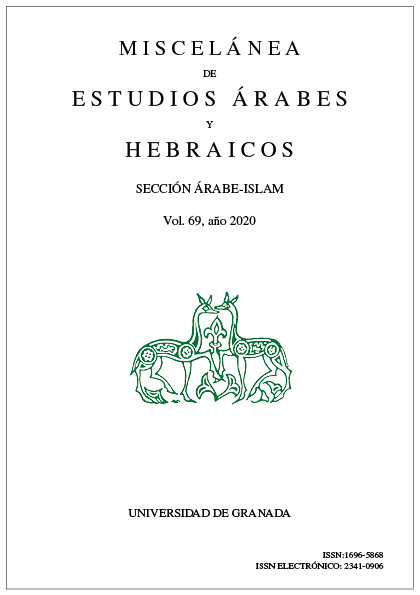Al-Ṭanṭāwī´s notebook: examples for teaching Egyptian and Arabic folklore
DOI:
https://doi.org/10.30827/meaharabe.v69i0.1052Keywords:
Muḥammad 'Ayyād al-Ṭanṭāwī, Egyptian Folklore, Arabic FolkloreAbstract
This paper analyses the notebook written by hand by al-Šayj Muḥammad 'Ayyād al-Ṭanṭāwī when he emigrated to Saint Petersburg in 1840 to teach classical and dialectal Arabic to the future Russian Orientalists. He would die there in 1861. The notebook, part of the collection held by Saint Petersburg University, is being edited and published for the first time. It consists of a series of anecdotes that can be divided into five cat egories: linguistic anecdotes (4), anecdotes about cadis, arbiters and governors (4), anecdotes with linguistic riddles (3), anecdotes about magic events (2), anecdotes written by the author about popular sayings and verses (10). The paper summarizes each anecdote and highlights its linguistic and folkloric content as part of the Arabic literary legacy. It concludes that the notebook forms part of Arabic and Egyptian popular cultural heritage and contains excellent material to be taught in universities and studied by researchers who wish to learn more about Egyptian linguistic variety in the nineteenth century.
Downloads
Downloads
Published
How to Cite
Issue
Section
License
The authors publishing their work in this journal agree to the following terms and conditions:
1. The authors retain the copyright and give the journal the right to be the first publication of the work and also to be licensee under a Creative Commons Attribution License which allows others to share the work, provided the author of the work and the initial publication in this journal are acknowledged.
2. Authors may make additional agreements separately for the non-exclusive distribution of the version of the work published in the journal (for example, putting it in an institutional repository or publishing it in a book), with acknowledgement of its initial publication in this journal.
3. Authors are allowed and encouraged to electronically disseminate (for example, in institutional repositories or on their own web page) the published version of their works (publisher's post-print version) or, if not possible, the author's reviewed and accepted post-print version. This is to facilitate productive exchanges, and allow for earlier and greater citation by third parties of the published works (See The Effect of Open Access).
4. The journal accepts no responsibility for the opinions expressed by the authors.















